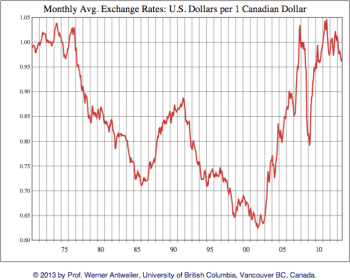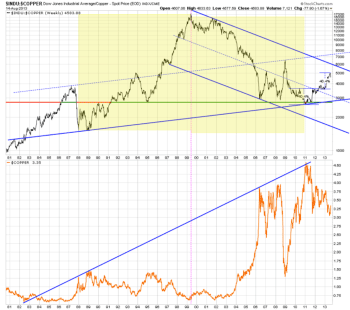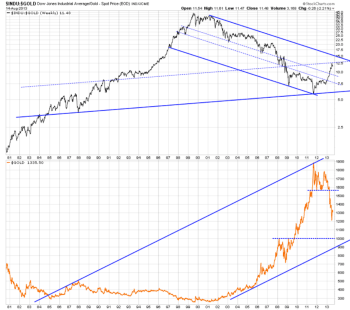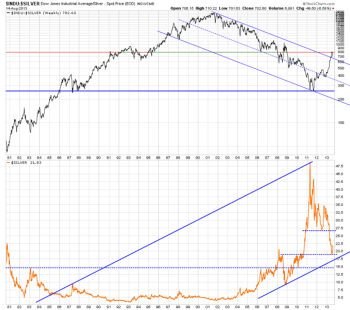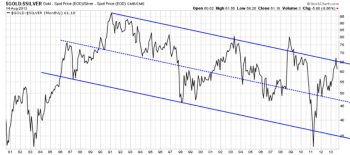|
|||
Flash in Pan or Pot of Gold?Peter Vogel This seems to be the question everyone is asking themselves. Many seem to come up with all sorts of “valid sounding” fundamental justifications of why gold is heading to $1000 or why its going to $2000 and higher. Naturally, these opinions lead to divisive behavior among many investors and confusion or uncertainty with the remainder. While we may not know the absolute fundamental factors that will cause tradeable movements in precious metals (except in hindsight), InvestorKey is not confused as to where we stand today. In our Jul 25 – Blog and similar articles posted Jul 30 on 321gold, we stated that gold might have one more pullback to the $1300 area, which is pretty much what happened. As highlighted in our Aug 5 – Blog “…Trend Change Coming?”, we suggested a trend change was coming and that the stock market may head down and the metals up, followed with entering Buy-Stop orders on SIL, GDXJ and SLV – this was two days before the corrective low in gold. At 1 pm EST in the Aug 7 – Blog “Important Turns Developing”, we noted trend breakouts in certain commodities and highlighted Cocoa and Cotton (we have a position in BAL @ $55) and that the “Moment of Truth” was approaching for precious metals. We recommended to Buy GDXJ @ Mkt-$37.60. Then at 4 pm EST we changed/added our Buy-Stop orders as follows: SLV @ $19.16 , SIL @ $12.31 , SLW @ $21.42 – All of these recommendations were filled the next day. Why we took these positions relates back to the title of this article and our view of the big picture. There are three things an investor must first understand about this bull market in precious metals:
Lets review; as it stands the gold bull market that started in approximately year 2001 at Gold-$250 and Silver-$4 has only finished its first major Wave I ten years later in 2011 at Gold-$1900 (7.6x) and Silver-$50 (12.5x). Now we are having a normal corrective wave that ought to be counted as A-B-C. The next wave up will be Wave III which will be the longest wave in price and probably take about 7 years to complete. From a technical perspective, the projected pathways have already been set and price targets can be calculated based on the Jun 2013 lows and using the two most probable extensions... however we will omit those as the full moon has not come out yet! Referring to points 1) and 2) above, let me digress with this story. On Nov 18, 2003, while attending an Innovation Conference in Canada, the discussion was about competitiveness with the USA and how to take advantage of the low Canadian Dollar, about $0.635 to the US Dollar at the time. I stood up and stated that Canadian companies should be thinking about how to compete in an environment where the Canadian and US Dollar are trading at par, because my projection was for $0.90 by 2007 and $1.40 by 2018 against the US Dollar. Well you can imagine the response was laughter and disbelief. Much to my chagrin, the Canadian Dollar went to $0.90 in 2006 and reached $1.10 in 2007, so I look forward to see how I do in 2018. The point is, these currency trends last a long time before enough damage takes place to change the market psychology dramatically enough to cause a change in a different direction. Note in the chart below, the Canadian Dollar topped in 1973 against the US Dollar and did not bottom until 29 years later in 2002.(*is that a 40 yr. bottoming pattern?*) (Click on images to enlarge) Obviously there are paradigm shifts taking place in a number of worldwide economic areas that have been partially reflected in the markets and should become even more dramatically evident in the future. Despite what has taken place in the last 10 years, it has not created enough fear to engage the masses to invest in the precious metals. While attending a mining conference in 2013, I tested a number of young people in there twenties (some were university geology students) by handing them a 1 ounce gold coin and asking them what it was worth – the responses ranged from $40 to $150. When asked if they would give me a $100 for it, they all responded negatively. To say I was astounded would be an understatement. Even my friends and relatives have completely ignored the precious metals the last 10 years. All I know is, that at the top of a bull market, everyone will know what the price of gold is and everyone will be invested in it - this bull market is not over by a long shot. The bigger question is what price of gold and silver will it take to get the majority of people excited and investing into the metals and mining stocks? Now back to the title of this article – Flash in Pan or Pot of Gold? Others have written that the bottom is in and some that gold is going to $1000. However, their reasoning leaves me wanting for a more quantifiable explanation, something that I can readily see and hang my hat on. What many analysts in the world apparently have failed to see is the importance of the 1987 and 2011 turning points as they relate to the relative price of the metals – few realize that the absolute price of the metals is not as important in their predictive value. That last statement is probably the most important statement anyone interested in making money on the markets should try to understand, but most likely will ignore. Case in point is the Dow Jones/Copper chart below, the time from the 1987 trough to the 1999 peak and then from 1999 peak to the 2011 trough are virtually identical (indicated by the offset yellow shading on each side of pink dotted line). This in itself indicates it has significance. The neckline from 1987-88 through 2011 when moved in parallel upwards perfectly marks the top of both shoulders of the pattern – again, significant. The predictive downtrend channel (1997 low through 2006 low) and its centerline perfectly bisect across peaks/troughs; the 2011 price trough stopped on the horizontal support going back to 1995 and 1990, that also marked the position for the 1987~2011 neckline; this entire H & S pattern therefore indicates that the Copper bull market vs Dow Jones from 1999 ~ 2011 was only Wave I of V Waves. Finally, the smaller H & S pattern that developed from 2009~2012 measured 40.4% distance to the neckline, subsequently the price rallied the exact same 40.4% to achieve the pattern’s price objective, hence we interpret that to mean this corrective wave is complete. Dow Jones / Copper – Weekly Chart I showed the Dow Jones/Copper chart first because if manipulation was a factor in the recent moves of gold or silver, then copper would likely represent a truer picture. In the two charts below, Dow Jones/Gold and Dow Jones/Silver, you can use the same prologue as I wrote for the Dow Jones/Copper above as an explanation, however you will note the anomaly in the Dow Jones/Silver chart where the price actually broke the upper predicted downtrend line but was immediately stopped by the horizontal resistance line. The price levels that could be achieved on this rally indicate $1475~1500 on Gold and $25~26 on Silver. Dow Jones / Gold – Weekly Chart Dow Jones / Silver – Weekly Chart One other interesting chart that shows the over-bought and over-sold trading levels of Gold and Silver is the long-term monthly Gold/Silver ratio. Note also how the 1987 low is significant in creating the lower predictive trendline from which the other center and upper parallel trendlines are drawn. This channel should offer important guidance well into the future to determine whether the metals offer value or not. Gold / Silver – Weekly Chart In Summary, despite any confidence I might have that the bottom is in, it is still best to treat this as a trading opportunity until such time $1600 on gold and $28 on silver is breached. Until that happens, there is always a risk that the metals could fall back further once this current rally completes, particularly if the stock market were to drop significantly. We are carefully watching the charts and moving our stops accordingly – we suggest you do the same. Come to our site to see our free long term charts http://investorkey.com/charts/ and consider taking advantage of our LOW introductory 3 - month trial offer! ### Aug 14, 2013 About Peter Vogel: The Writer of this Blog began his investment career in 1981, first as a Floor Trader and then as an Investment Advisor for a major securities firm. During that time he acquired several securities and options licenses and became registered as a Commodity Trading Advisor (CTA). He also co-founded a venture capital organization that helped finance and commercialize a number of new technologies. Since the beginning of his 33+ years of investing, he developed his own style of technical analysis by focusing on ratio analysis and money management techniques, creating methods that often allow him to buy near precise turning points with confidence. His decision to publish this information stems from recognizing the abundance of misinformation and bad analysis that exists and the need to help investors understand how to understand and view the markets and invest properly. Some of his favorite trading mentors are Larry Williams, Martin Pring, Thomas DeMark and William O’Neil. When it comes to deciding whether or not to use an investment writer’s service, you should understand that their background or so-called “proprietary” gimmickry really does not matter. The evidence in this statement bears itself out by the simple fact that Michelle Williams at the age of 17 won the World Trading Championship in 1997 making a 1000% return, which has not been surpassed since. The only thing that matters is whether their service can help you make money. |

